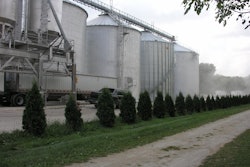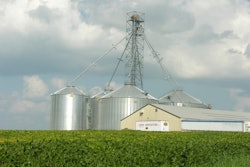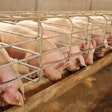The Food Safety Modernization Act (FSMA) has prompted grain handlers and feed manufacturers to adopt a proactive approach in preventing food borne contamination. Pathogens and sanitation concerns aside, one fundamental consideration to any food safety or HACCP plan must take biosecurity into consideration, i.e. the intentional or unintentional contamination foodstuffs by internal or external entities.
"Anyone who has access to the food supply is anyone who has access to it along the supply chain," says Mark Powers, vice chair of ASIS food defense and agriculture. "Many will tell you it's unlikely that a terrorist is going to come to the U.S.to try to get infiltrate a manufacturer to introduce a contaminate into the food supply, but the scenario that plays out every day in the United States is the disgruntled worker who doesn't understand the actions they take have will have greater ramifications or costs to the business than they think."
Powers, who has worked in counterintelligence at Fort Knox and corporate security for 25 years, has spent the last 10 years of his career specializing in food defense for two of the largest U.S. food and beverage companies.
The disgruntled worker knows your systems, processes and weaknesses better than management. One way to screen for potentially troubled employees is to conduct thorough background checks on all new hires. Powers suggests doing more than a criminal background check, but should include drug screening and two-tier reference checks by getting another name from the provided references.
In the workplace, management should create an environment that does not tolerate any behavior out of the norm. By setting standards and providing a mechanism that allows employees feel comfortable reporting violations. He suggests that when an incident occurs employers should take swift action.
"In my experience, companies who have shown to quick resolve have fewer incidents; however, sites that are more lackadaisical in their enforcement of policies find themselves on a slippery slope and they are subject to more risk," Powers says. If you interview employees after the fact, some may have known but not been involved will say they knew and had reported it, but nothing was done.
It's how the company totally looks at the company deals with disciplinary challenges, sloppy work, hostile behavior, tardiness issues, etc., that would indicate that the employee is a risk. These should be looked at in total on an employee and ask if you are at risk if they continue to work with the product. If you do have an incident and there is a criminal investigation, these are the questions investigators will be asking to determine the perpetrator and if you've ignored the red flags you're putting the company in a bad position.
Though documentation and coordination with HR can help make decisions as a team on employee issue before they become a problem.
External threats
In rural areas it can be difficult to secure an isolated site _


















